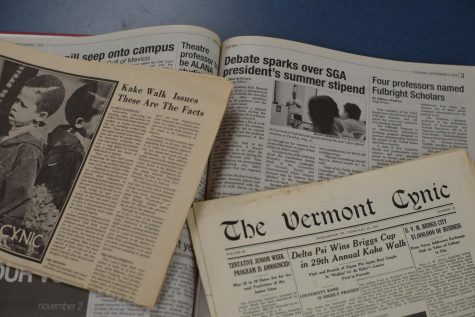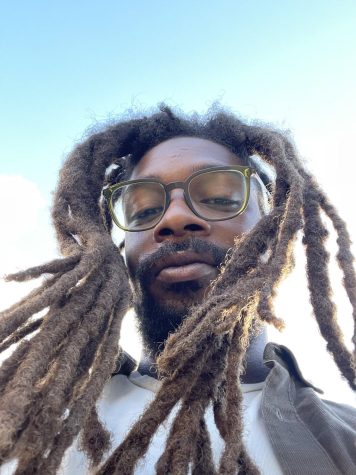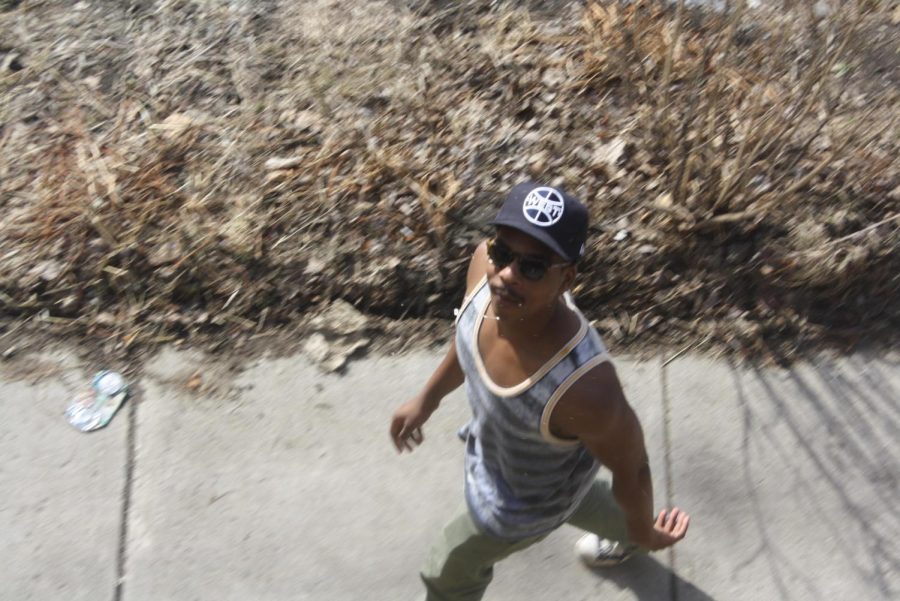Photo Courtesy of Simeon Marsalis
Simeon Marsalis ‘13 during his time at UVM, where he started writing fiction. His 2018 novel, titled “As Lie is to Grin,” references his experience on UVM’s predominantly white campus and the accompanying disassociation.
Reckoning with our past: A conversation with author and UVM alum Simeon Marsalis
April 6, 2023
Simeon Marsalis ‘13 is an author and a professor of English at Rutgers University-Newark.
However, he was once a student at the University of Vermont, an experience he drew on heavily in his 2017 novel, “As Lie is to Grin.”
The novel follows David, a Black student in his first year at UVM, who grapples with both the loss of his girlfriend back home in New York and his learning of UVM’s racist history.
In an interview with the Cynic, Marsalis discussed his own experience at UVM and how it shaped the novel, as well as his own understanding of and reckoning with the University’s dark past.
Artistic background
Marsalis comes from an artistic family but, ironically, this upbringing had both discouraging and developmental impacts on his personal artistic expression, he said.
His father, Wynton Marsalis, is a famous trumpeter and is the artistic director of jazz at The Lincoln Center.
His father was friends with writers like Stanley Crouch and Albert Murray, Marsalis said.
“Those two writers really intimidated me,” he said. “So when I was growing up, I never really considered what it would be [like] to be a fiction writer or a writer of any stripe.”
However, this artistic exposure also made Marsalis feel art was accessible, he said.
“Because I do come from a family of musicians, the possibility of creating art as an adult was never something that was off limits to me” he said.
Marsalis’ UVM experience
Marsalis initially came to UVM for basketball but stopped playing after his sophomore year, he said.
He attributed this to the limitations of being a student-athlete and poor working conditions the players faced.
“It was hard for me to be an athlete [at UVM] because I was very, very upset at the working conditions of athletes at the time,” he said. “I felt like, at the time, the University relied upon athletes in order to drive recruiting their students.”
Marsalis majored in religion and wrote his thesis on jazz and nationalism, he said.
He expressed appreciation for everyone within the religion department for shaping his experience at UVM.
“They helped me find my way in so many different ways,” he said. “It was a rigorous department, but so fair.”
During his time at UVM, Marsalis struggled with his mental health, he said.
“I think, like a lot of college students, I was dealing with depression at the time,” he said.
Prior to quitting the basketball team, Marsalis had begun writing short stories on the buses to and from games, he said. While initially discouraged by his teammates and coaches, he began to pursue writing more seriously.
This passion for fiction writing helped greatly with his mental health, he said.
“I’m not going to say it saved my life, but it certainly allowed me to fight my way out of a certain type of depression.”
Writing fiction at UVM was a large inspiration for “As Lie is to Grin,” he said.
“As Lie is to Grin” and UVM
The novel ties in many aspects of UVM’s campus culture and Marsalis’ own experience at UVM, he said.
In the novel, David struggles to define himself in UVM’s predominantly white student body, Marsalis said. He begins to dissociate from the campus community and obsessively research UVM’s history.
Marsalis discussed his own encounter with UVM’s racist past when researching for the novel.

“I had no idea about the history of the University as it pertained to Black people or the Kake Walk,” Marsalis said “I only knew the positive stuff.”
The Kake Walk was a tradition that coincided with the Winter Carnival in which fraternity brothers would annually dance in blackface, according to a Feb. 26, 2016 Vermont Cynic article.
The tradition formally ended in 1969, according to the Cynic article.
“I was so shocked,” he said, “I didn’t know anything about it.”
Marsalis used UVM’s digital Kake Walk archives to conduct research for the novel.
“It wasn’t until I got off campus and I found all these old Cynic articles,” he said. “I was rummaging through that whole digitized archive from the two years after I left the University of Vermont.”
Marsalis also included Cynic articles from his own time on campus in the novel to demonstrate David’s dissociation from UVM’s campus life, he said.
“I am trying to say how, even though David was on campus, how distant he felt from the happenings that were being written about—how news can aggregate information for people who may not be experiencing the news that’s being aggregated all around them,” he said.
Marsalis added that the inclusion of both past and present Cynic articles allowed for a representation of the way history is documented.
“I wanted to show people how things kind of don’t change. I think the Cynic or any type of newspaper is a good way to show how an official narrative can continue,” he said.
For example, the novel includes a reference to a Sept. 6, 2010 Cynic article titled “Debate sparks over SGA president’s summer stipend.”
At the time, then-SGA President Kofi Mensah ‘11 was under fire for receiving money to work for SGA over the summer, according to the article. Some SGA senators felt he had not worked sufficiently enough to earn the stipend he was given.
Marsalis used this example as well as other references to demonstrate the way a racialized narrative can continue, he said.
In the book, David feels personal resonance with the attack on the SGA president due to their shared Black identity.
Marsalis drew on his own personal feelings from being on campus at the time of this debate and, like David, sharing a minority identity on a majority white campus for this portion of the book.
“I remembered being a student at [UVM] and feeling like a lot of the criticism of the [SGA] president was racialized,” he said. “There was no awareness around how racist the dialogue was, and how much it was being affected by the color of the president himself.”
Marsalis also used UVM’s architecture to represent changes in attitude and dialogue over time, he said.
The book includes detailed descriptions of UVM’s buildings and even pictures of the architecture.
“I think architecture does a good job of showing us how the University has changed over time,” he said. “Because it does stay for so long, it is so much more permanent.”
He discussed the way both the Cynic and UVM’s architecture added to David’s emotional journey in the book.
“I think [UVM’s architecture] allowed David to express a more dissociative mode,” he said. “Because they’re inanimate, you can just kind of stare at them. You can feel like you’re outside the time that you’re living in.”
Like his protagonist, Marsalis’ own experience at UVM had both benefits and drawbacks, he said.
He expressed the difficulties of being a student of color on a predominantly white campus.
“I think because [Vermont] itself is so white, and it is a state university, there was always going to be difficulty for me as a Black student from New York state,” he said.
He added that in many places he felt unwelcome.
“In Burlington, which is a place that often seems to be a type of utopia—it felt very segregated,” he said. “In a lot of spaces, I didn’t feel particularly welcomed.”
That is not to say that his experience at UVM was overwhelmingly negative, he said. There were many positive experiences.
“One of my favorite experiences [was when] I got to hike Mad River Glen at two o’clock in the morning with a bunch of my friends,” he said. “We woke up on the mountain and that was pretty exquisite.”
Marsalis added that he has maintained a lot of his friendships from UVM to this day.
He also credited UVM with empowering him to think about climate change.
“[UVM] definitely got me on my own path to considering the ways in which we affect the environment,” he said. “Lessons that I keep to this day, the water bottle that I bring around.”
Reflections on the novel
Since its publication in 2017, Marsalis has reflected on the novel’s content and its significance in his own life, he said.
Marsalis’ reflections on his book have evolved and taken on new meanings since its publication, he said.
For example, in the book, David lies to his girlfriend, Melody, about where he is from, telling her he lives in Harlem when he really lives on Long Island in order to impress her, as she lives in the city. He maintains this lie throughout the entirety of their relationship.
Marsalis expressed interest in the way the ethical discussion around David’s lie has shifted since the book’s publication.
“When I wrote [the book], we hadn’t started to investigate rape culture as much as we investigate it now,” Marsalis said. “I think there are some really interesting conversations to have with the ethics of sexuality in the book, particularly around David’s decision to lie to Melody.”
He expressed interest in learning what students on campus today thought about this debate versus the conversation around sexuality when he was on campus, especially given the ongoing debate around sexual violence at UVM.
“I would be really interested in the conversations around ethics and around David’s own sexuality on campus,” he said.

Looking toward the future
While teaching English at Rutgers University-Newark, Marsalis continues to write fiction.
He’s currently working on a novel called “End Times,” and a trilogy of other novels, although the content remains a secret, he said.
“I can’t tell you anything about it, except that it does involve research that I started on that honors thesis about jazz and nationalism,” he said.
Marsalis also has a short story called “The Dryer,” which will be published in Epic Magazine this summer.
He is one of 13 writers in the Lampblack Writers Collective, which provides direct monetary aid to Black writers, hosting a reading series and publishes a magazine, according to its website.
Two issues of the magazine are already available and a third will be published in October, Marsalis said.
Marsalis expressed the importance of reckoning with the past while striving for a better future, especially as it relates to UVM as an institution.
“I think raising awareness around things that have happened in the University’s history is a good place to start,” he said.
